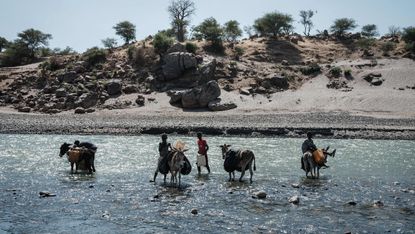Ethiopia’s civil war: from ‘African success story’ to brutal conflict
The conflict in Tigray has left thousands dead and some two million displaced, with refugees pouring into neighbouring Sudan

Until a few years ago, Ethiopia was considered “an African success story”, said Andrea Böhm in Die Zeit (Hamburg). Having freed itself from a “murderous socialist dictatorship” and a “vicious circle of droughts and famines” in the 1980s, the country was on the up: the economy was booming; its 20-year war with neighbouring Eritrea had come to an end. How different things look today.
For the past seven months, a bitter civil war has been raging between government forces and regional leaders from Tigray, in the country’s north. The conflict has left thousands dead and some two million displaced. Refugees have poured into neighbouring Sudan. Even more troublingly, an estimated four million people are now at risk of famine. Crops have been decimated by drought, fire and locusts; and government troops have reportedly blocked aid from reaching civilians, suggesting they’re ready to “use hunger as a weapon”. It’s a “horrific” situation–and one that’s all too familiar to those who endured Ethiopia’s past miseries.
Human rights groups have been sounding the alarm over this appalling conflict for months, said La Repubblica (Rome). They point to evidence of the “systematic” rape of thousands of women and girls in Tigray – which is home to seven million of Ethiopia’s 115 million people – and have warned that sexual violence is being used as a “weapon of war” by Ethiopian government soldiers and the Eritrean troops fighting alongside them. Yet the international community has “ignored” their warnings.
Subscribe to The Week
Escape your echo chamber. Get the facts behind the news, plus analysis from multiple perspectives.

Sign up for The Week's Free Newsletters
From our morning news briefing to a weekly Good News Newsletter, get the best of The Week delivered directly to your inbox.
From our morning news briefing to a weekly Good News Newsletter, get the best of The Week delivered directly to your inbox.

Now, that’s starting to change, said Medihane Ekubamichael in The Addis Standard (Addis Ababa). In late May, US president Joe Biden imposed visa restrictions on Ethiopian and Eritrean officials, and announced curbs on American economic and security assistance to the country, a key US ally in Africa. Warning of the risk of “widespread famine”, he called on Ethiopian and Eritrean forces to “allow immediate, unimpeded humanitarian access to the region”, and demanded an end to the “large-scale human rights abuses” happening there.
Ethiopia’s Nobel Peace Prize-winning PM, Abiy Ahmed, likes to present this conflict as a “law enforcement operation”, said Alex de Waal on Al Jazeera (Doha). He has railed against “foreign meddling” while seeking to deflect blame to the Tigray People’s Liberation Front (TPLF), which governs the region and has led the fighting against government forces. Yet the atrocities committed by his troops appear to be galvanising his opponents, said Africanews.com (Lyon). Support for the TPLF, which the government has labelled a terrorist organisation, is growing; and fighting has spread to the region’s “rugged highlands”. With neither side showing any sign of giving in, the chances of this brutal conflict ending soon look tragically slim.
Sign up for Today's Best Articles in your inbox
A free daily email with the biggest news stories of the day – and the best features from TheWeek.com
Create an account with the same email registered to your subscription to unlock access.
-
 Nigeria's worsening rate of maternal mortality
Nigeria's worsening rate of maternal mortalityUnder the radar Economic crisis is making hospitals unaffordable, with women increasingly not receiving the care they need
By Harriet Marsden, The Week UK Published
-
 'Elevating Earth Day into a national holiday is not radical — it's practical'
'Elevating Earth Day into a national holiday is not radical — it's practical'Instant Opinion Opinion, comment and editorials of the day
By Harold Maass, The Week US Published
-
 UAW scores historic win in South at VW plant
UAW scores historic win in South at VW plantSpeed Read Volkswagen workers in Tennessee have voted to join the United Auto Workers union
By Peter Weber, The Week US Published
-
 Puffed rice and yoga: inside the collapsed tunnel where Indian workers await rescue
Puffed rice and yoga: inside the collapsed tunnel where Indian workers await rescueSpeed Read Workers trapped in collapsed tunnel are suffering from dysentery and anxiety over their rescue
By Sorcha Bradley, The Week UK Published
-
 Gaza hospital blast: What the video evidence shows about who's to blame
Gaza hospital blast: What the video evidence shows about who's to blameSpeed Read Nobody wants to take responsibility for the deadly explosion in the courtyard of Gaza's al-Ahli Hospital. Roll the tape.
By Peter Weber, The Week US Published
-
 Giraffe poo seized after woman wanted to use it to make a necklace
Giraffe poo seized after woman wanted to use it to make a necklaceTall Tales And other stories from the stranger side of life
By Chas Newkey-Burden, The Week UK Published
-
 Helicopter sound arouses crocodiles
Helicopter sound arouses crocodilesTall Tales And other stories from the stranger side of life
By Chas Newkey-Burden, The Week UK Published
-
 Woman sues Disney over 'injurious wedgie'
Woman sues Disney over 'injurious wedgie'Tall Tales And other stories from the stranger side of life
By Chas Newkey-Burden, The Week UK Published
-
 Emotional support alligator turned away from baseball stadium
Emotional support alligator turned away from baseball stadiumTall Tales And other stories from the stranger side of life
By Chas Newkey-Burden, The Week UK Published
-
 Europe's oldest shoes found in Spanish caves
Europe's oldest shoes found in Spanish cavesTall Tales And other stories from the stranger side of life
By Chas Newkey-Burden, The Week UK Published
-
 Artworks stolen by Nazis returned to heirs of cabaret performer
Artworks stolen by Nazis returned to heirs of cabaret performerIt wasn't all bad Good news stories from the past seven days
By The Week Staff Published